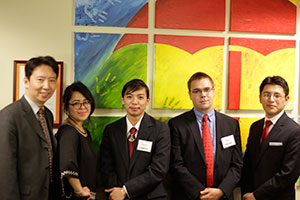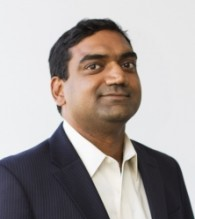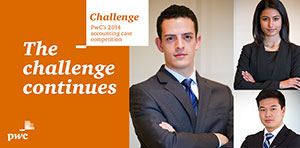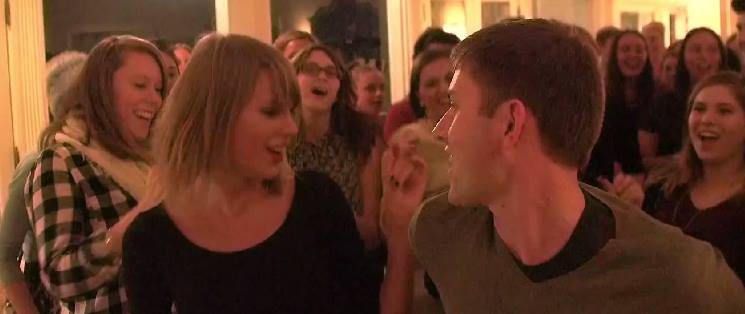 A team of UConn students that proposed a ‘smart-home’-style device for small businesses placed second in the 2014 Travelers IT Case Challenge on November 7 in Hartford.
A team of UConn students that proposed a ‘smart-home’-style device for small businesses placed second in the 2014 Travelers IT Case Challenge on November 7 in Hartford.
“Our team was poised and prepared, earning second place and representing UConn well,” said Wei-Kuang Huang, the team mentor and a professor in the Operations and Information Management department.
The student team included: Khaly Huynh, Eddison Buenano, Jeffrey Avery and Rubi DeLeon. All are seniors majoring in business data analytics, except DeLeon, who is majoring in business administration. They will divide a $700 award and each has the opportunity to participate in a job interview with Travelers.
First place and a $1,400 prize was awarded to the Carlson School of Management from the University of Minnesota. Other participating schools included: Bentley University, Central Connecticut State University, Quinnipiac University and University of Wisconsin.
“The competition at Travelers was both challenging and rewarding,” Avery said. “Professor Huang was a great mentor and the group really came together as a whole to achieve an awesome result.”
For their case competition, the students had to determine what new investment would benefit the company’s business insurance division. They chose a “smart home technology” paired with a mobile encryption technology and pitched it as a service for small businesses.
The UConn team’s recommendation to Travelers was to utilize it to create new business value, allowing a small business owner to lock doors, view video and audio, control appliances and other tasks from a smartphone. In turn, this would benefit the insurance company because it would lower an insured company’s security risk profile.
“We had only about two weeks from the time we received the case to the time we presented to Travelers, but even before the case, we met weekly to research current IT trends in the insurance industry,” Avery said. “This came in handy during our question-and-answer session, following our presentation, because we were quite well-versed in issues surrounding IT. Secondly, it turns out that Travelers is currently implementing smart-home technology with some of its clients, so our case turned out to be highly relevant.”
Avery said the team had tremendous support from peers at UConn as well as alumni, who took the time to view practice presentations and provide valuable advice and insight. All four students were enrolled in Huang’s OPIM 3103 class, where they had already been given a case study relevant to the insurance industry. It turned out to be valuable practice when the Travelers’ case competition arose, Avery said.
The competition was open to IT students with high GPAs. The students spent more than 40 hours researching, meeting and rehearsing, Huang said. The teams presented their findings to a panel of Travelers senior management. They also had a chance to network with the executives during the competition, which was held at the Travelers’ headquarters in Hartford.
Pictured L to R: Wei-Kuang Huang, Rubi DeLeon, Khaly Huynh, Jeffrey Avery, and Eddison Buenano.




 Upon getting home, I posted a Polaroid picture of Taylor and myself from the night on my social media accounts, and even my close friends were quick to dismiss it as photoshopped. The next morning, I woke up to find Taylor, herself, had Tweeted and Instagrammed our photo, validating the entire experience and essentially bringing my social media project full-circle.
Upon getting home, I posted a Polaroid picture of Taylor and myself from the night on my social media accounts, and even my close friends were quick to dismiss it as photoshopped. The next morning, I woke up to find Taylor, herself, had Tweeted and Instagrammed our photo, validating the entire experience and essentially bringing my social media project full-circle.
